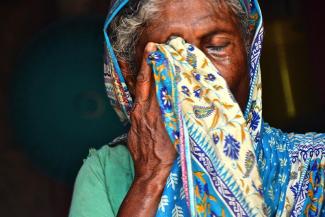Adapting to climate change
The view from below

Bangladesh has an early warning system (EWS) for cyclones. Nonetheless, Sidr, the storm that hit the coast in November 2007, killed up to 10,000 persons, according to the Red Crescent Society. Sonja Ayeb-Karlsson knows some of the reasons why so many people did not escape the disaster. In some villages, for instance, the EWS messages arrived too late, so people did not have enough time to flee to a cyclone shelter. Perhaps even more important, however, some people chose not to go to shelters at all. They wanted to stay with their cattle or their boats because their families’ livelihoods depend on those assets. People risked their lives in the hope of being able to rescue their sources of income.
Ayeb-Karlsson belongs to a team of scholars who are researching what impact climate change has on poor people’s livelihoods in Bangladesh with a view to making local communities more resilient. They did field studies in six villages and an urban slum to find out how exactly poor make their living and how they are adapting to change. The project is called Gibika, which means livelihood in Bengali. It is run by the International Centre for Climate Change and Development (ICCCD) at Bangladesh’s Independent University in cooperation with the UN University’s Bonn-based Institute for Environment and Human Security and Munich Re Foundation.
As Saleemul Huq of the ICCCD points out, measures to cope with cyclones have been taken in Bangladesh, and they work. In the past, cyclones caused even more harm. Cyclones of Sidr’s force claimed up to 130,000 lives in 1991 and more than 500,000 in 1970. However, up to 10,000 dead in 2007 showed that the EWS was not saving all lives. It must therefore be improved. Research done by Gibika indicates that it would help to build more, but smaller cyclone shelters, for example, so villagers could be safe closer to their homes in emergencies. Adequate pay for the workers who operate the EWS would make a difference too.
Gibika’s research shows that people’s livelihoods are changing. More village people are flocking to the urban areas in search of work in seasons when they cannot make money in rural areas. Their financial situation improves thanks to such labour migration, but there are downsides. The sanitary conditions in urban slums are worse than they are in the villages, for instance, so the migrants are more likely to fall sick. Moreover, most of them do hard physical work and are prone to be hurt in accidents. According to Ayeb-Karlsson, shocks of this kind often erase the additional income they generate in the city.
It is obvious that Bangladesh’s economy must be diversified for more people to get opportunities in other sectors than agriculture and fishing. It is equally clear that new industries tend to cluster in towns with the necessary infrastructure. So far, however, Bangladesh’s urban development is concentrated in Dhaka, the fast growing capital agglomeration of some 18 million people today. ICCCD scholar Huq says that it is essential to redirect urban growth to smaller towns for the country as a whole to adapt to the challenges of climate change.
The government and international donor institutions are aware of what is at stake. On behalf of Germany’s Federal Minister for Economic Cooperation and Development (BMZ), agencies such as GIZ and KfW are supporting state agencies in Bangladesh in areas such as infrastructure and municipal government.
These efforts are valuable, but they must not bypass the communities of the poor. In Huq’s experience, the most vulnerable people have a clear understanding of their situation and know what would help them. The mission of Gibika, therefore, is to involve the people in planning and decision making. Local communities must be made aware of the services they are entitled to and enabled to claim that they be delivered. In Huq’s eyes, cooperation of scholars and grassroots communities can make the difference (see interview http://www.dandc.eu/en/article/climate-diplomacy-veteran-bangladesh-explains-why-paris-summit-will-not-solve-all-problems in D+C/E+Z 2015/06, p. 16 f.).
Hans Dembowski
Links:
http://ehs.unu.edu/research/gibika.html#outline
http://www.munichre-foundation.org/home/DisasterPrevention/Gibika-Bangladesh.html








